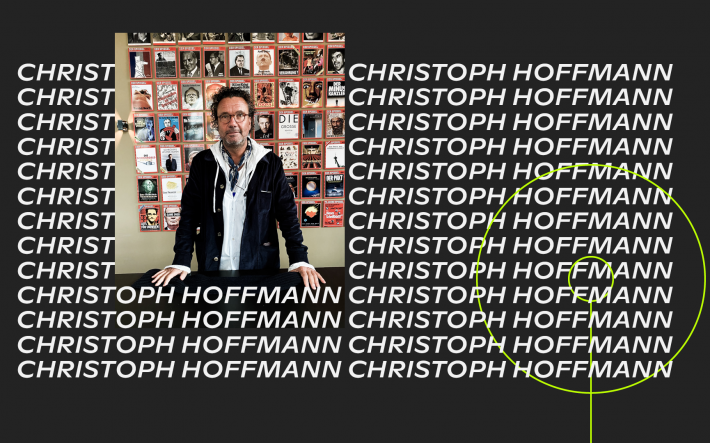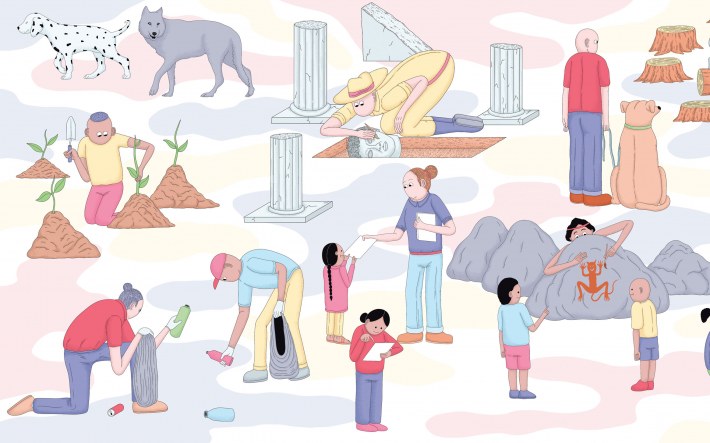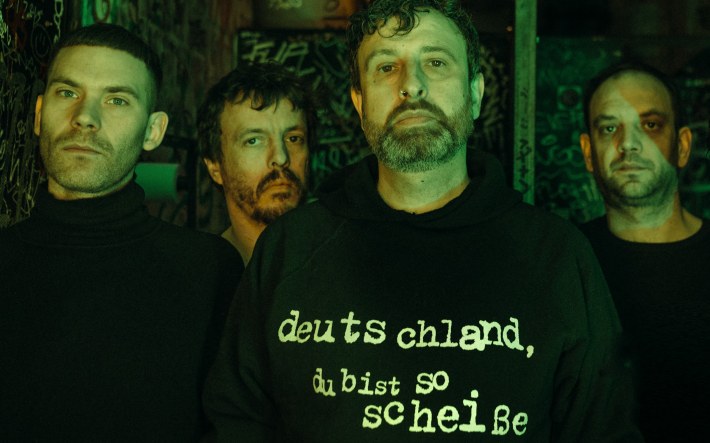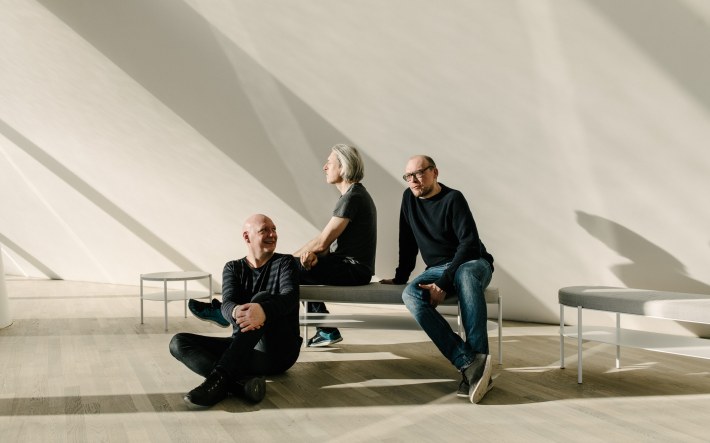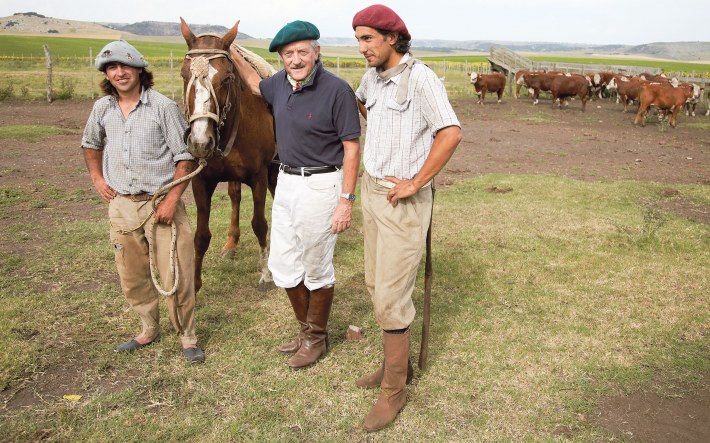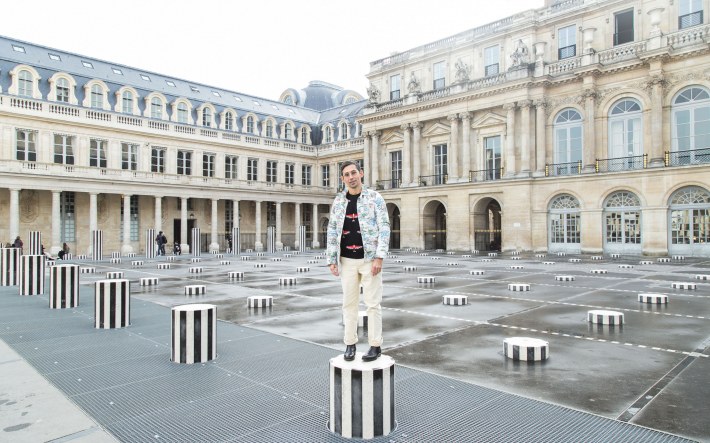Ballads of a Bad Boy
It’s hard to believe that Julian Pollina — better known as Faber — is just 26 years old. Given the grit of the Swiss singer-songwriter’s voice and lyrics, you’d be forgiven for assuming he’d seen at least two decades more.
Sung in German, his 2017 debut album, ‘Sei ein Faber im Wind’ (Be a Faber in the Wind) leaves no subject unscathed in its wake. Its tracks set salacious wordplay to soaring melodies, recalling the husky snarls of Jacques Brel or the warbles of Balkan folk music — it is a new brand of melancholic dance music that’s captured the world-weary hearts of Faber’s generation. Ahead of his second album’s release, in late 2019, Faber emerged from the recording studio to speak with COMPANION about the blurred lines between fact and fiction, being bored in Zurich, and why he wouldn’t get along with Kanye.
COMPANION: Hey Faber, what are you listening to at the moment?
Faber: I’m pretty much only listening to music as a form distraction right now — and to unwind. That, or antisocial Italian trap tracks. I’m looking forward to the upcoming Lana Del Rey album too.
Since your first album was released, in 2017, you shot to fame pretty rapidly. What has that experience been like?
[laughs] I don’t really feel all that famous, but I get the sense that my concerts are getting better. I’m noticing that my music touches people, which I’m really happy about. The downside of fame is the pressure it puts on you. I feel like I’m under constant scrutiny on a certain level, which isn’t so great. But I’m trying to make sure that my personal life stays unaffected by it all. It’s important to me that the private stays private.
What are your strategies for that?
I haven’t been so successful in it so far, actually. Even on nights out, when I think I can switch off, I can’t. I’m beginning to realise that’s not a real method for escapism. [laughs]
You grew up in an artistic family with a musical father, the Italian singer-songwriter Pippo Pollina, but weren’t so interested in the traditional musical education you received at a young age. What got you hooked again?
I didn’t enjoy going to school, but I wasn’t interested in working either. I somehow discovered that there was a gap in the music market [in Zurich] — this was around 2010. No one was playing at weddings and big parties. I managed to start earning a lot of money in a short amount of time doing that. And I came to realise there was nothing I wanted to do more than perform live.I finished school in 2013 and then started doing it full-time. I wasn’t afraid at all going into it, which, looking back, was pretty naive. I just thought, ‘If I enjoy doing it, and if I do it often enough, I’ll keep getting better, and at some point someone will notice that, and then it’ll take off.’
And it did. What was the journey like from that point up until your first album?
It was definitely a long process, around about four years. I was playing live a lot in the meantime — because that’s what I love doing the most, and also because that’s what brings in the cash. It was also a lot of fun, and it taught me a whole lot. The first album ended up being pretty much a live recording as a result. We said to ourselves, ‘Let’s just go into the studio and record, playing as we always do.’ We all just got in sync. There was hardly any post-production involved. It was a lot of fun — raw and real, not totally perfect, but the energy was good, and I think that’s exactly what makes it so strong.

How did you come to settle on Faber as your artist name?
I wanted to keep a certain distance from my real name — between my private life and my persona — as a form of protection. The name comes from a combination of influences — there’s the book ‘Homo Faber’ by Swiss author Max Frisch, and then there’s one of the greatest Italian singer-songwriters, Fabrizio De André, whose nickname was also Faber. I thought it would be nice to bring these influences together. It’s not a very fashionable name, which means it will never go out of fashion either. It’s neutral and short and hopefully easy to remember. Those were the kinds of factors that led me to adopt it. And once I’d made the decision, that was it. I never looked back.
You and your music have been given a host of different labels: singer-songwriter, world music, acoustic, or indie pop…
[laughs] I think that all fits quite well, actually — I wouldn’t deny any of those labels. They’re all alright.I think the best approach is to go with what people say. Each of those descriptions touches on a part of who I am, but somehow none of them tell the whole story. But I’m not that bothered by it. I think that genres aren’t all that clearly defined these days. Everyone’s allowed to do everything, and no one listens to just one genre anyway. That’s not how it works. Everything’s all mixed in.
Your influences transcend genres and epochs — from Jacques Brel to Kanye West. Which five musicians, dead or alive, would you like to invite to a dinner party?
Well, that depends on whether or not you want to enjoy the evening. [laughs] To be honest, I’d rather not spend time with musicians. I don’t think that would make for the nicest time. I like Kanye a lot, but I would never want to hang out with him. That just wouldn’t work. How could you even have a conversation with him?
What’s it like to be a young artist living in Zurich?
It was very, very boring for a long time, very uniform, and even now it’s not substantially better, but that’s finally starting to change. Slowly more and more people are bringing in new energy. But I findSwitzerland very conservative in general.
Yet it’s still your home. Surely there are some advantages to living there?
There are no advantages. [laughs] It’s damn expensive, people aren’t friendly, the weather’s bad 90 percent of the time, it’s impossible to find an apartment — there isn’t a single reason to be here. It’s only because I grew up here and because my friends and family are here that I still am too.
You have the chance to escape this summer, when you’ll be touring Germany and Austria. What’s been your favourite experience so far?
So there’s this little festival near Basel called Mondsucht, and it’s run completely without power, even for the musicians — it’s all acoustic. There are around 1,000 people, and the atmosphere is amazing — with tents and candlelight and mirrored installations. I always enjoy playing in Vienna too. The city is beautiful, and its people are lovely.
What do you always have with you while you’re touring?
The most important thing is fresh laundry. And good friends. Everything else can be picked up along the way. [laughs]

Some of your songs — like ‘In Paris brennen Autos’ (Cars are Burning in Paris) — touch on political topics, and you’ve recently started campaigning for water as a human right with Viva con Agua. How do you see your agency to advocate for political change?
I definitely think it’s important to use the platform you have to make a difference. Especially in such difficult times, it’s important to speak up. Even just with what’s going on in Europe at the moment, artists have a responsibility to take a stand for what they believe in. Honestly, I can’t see how it’s going to get better in the next few decades. Sadly.
On the topic of politics, you’ve received a lot of criticism for your use of words like Nutte (slut) and Hure (whore) to describe women in your songs. In the wake of #MeToo, what’s your take on sexism in pop music, and your own responsibility within it?
My position hasn’t changed. That’s to say, I’m for complete equality. In a lot of areas, there’s still a lot we need to learn — that goes for everyone, women as well as men, of all ages. Yes, I use a lot of crass language in my songs, and I’ve realised that it doesn’t come across well with everyone. My songs that contain sexist language use those kinds of words to shed light on the issue of sexism. I don’t want to validate sexism in any way, but instead provide a critique that reveals the way in which people behave. I’ve been partially successful in that goal, but some people haven’t understood my intention and think that I’m some kind of disgusting old man.
There’s a lot of wordplay running through your lyrics – ‘Mit mir bist du allein / Lass mich nicht los / Lass mich nicht auf dich los’ (With me you’re alone / Don’t let me go / Don’t let me go at you). What story did you want to tell with this song?
It’s about two people who like and love and want each other, but this intensity also gives them the power to destroy the other person. That’s the tension between ‘Don’t let me go / Don’t let me go at you.’ They can’t live with each other, but they can’t live without each other either.
That song, ‘Lass mich nicht los’ (Don’t Let Me Go), is accompanied by a dramatic and beautifully shot video depicting scenes of a tense and dark relationship that raises more questions than it answers with its ominous ending. For you, what role should a video play in enhancing a song?
In the best case, it should offer another perspective on the story. I think it’s intriguing when it does more than just accompany the song. It should shed light on another aspect of it. But that’s really difficult to achieve. I’d like to get better at it in future.
Many of your songs have a sad undertone to them.Do you write music for sad people?
It’s always very melancholic, that’s true. But it’s equally true to say it’s music to dance to. I find this combination interesting. It’s not so prevalent in Swiss culture, but in Eastern Europe — the Balkans — people often have parties where sad music is played. This idea of a sad party — that’s what intrigues me. It should contain an element of surprise, and sometimes veer into the political.

From where do you take inspiration when writing your lyrics?
From my own life, unfortunately. I’ve experienced years that have been less than happy. I also think it’s pretty standard to draw upon your own life, as it’s what preoccupies you, both personally and in terms of your place in society.
On the other hand, you’ve been known to say that the line between truth and fiction should sometimes stay blurred.
That’s very important to me. That happens all the time in songwriting, of course. People lie, make things up. Listeners don’t need to know what’s true and what isn’t. Then the magic ends up being lost. A good story shouldn’t be spoiled by the truth. That’s what keeps things interesting.
Do you find it therapeutic to work through things that have happened in your life with your lyrics?
Yeah, maybe a little. It’s true that when I haven’t felt great, or when something has gone wrong, I’ve managed to process it with my music, let go of some of the anger. It works just as well as, say, going to the gym — that goes for writing as well as playing. It’s been six months since the last [live show] now, and they’ve been a long six months. I’ve come to realise how much playing live gives me, both physically and psychologically, and when I don’t do it, I notice a gaping hole in my life. At one point in the last year, I thought, ‘It’s finally nice to do nothing and just relax for once.’ But in the end it wasn’t at all relaxing. It was just sad. I can’t wait to play live again.
What exactly is it about playing live that you love the most?
The best thing about it is that you give everything, you put all of yourself into it, and in turn you get so much back. You can be feeling half dead, having not slept for three days, but because there’s so much energy coming back at you from the crowd, with so many emotions, it picks you right up again. You experience this intimate moment of energy exchange that feels so good.
You’re currently working on your second album, which is due out in late 2019. What can we expect?
I’m working on it at the moment and hope that it’ll all go smoothly. In terms of lyrics, in any case, the common thread running through my past songs will continue. It won’t get any less painful. It’ll stay highly political and at the same time very personal. There’s no topic that’s off the table. [laughs]



